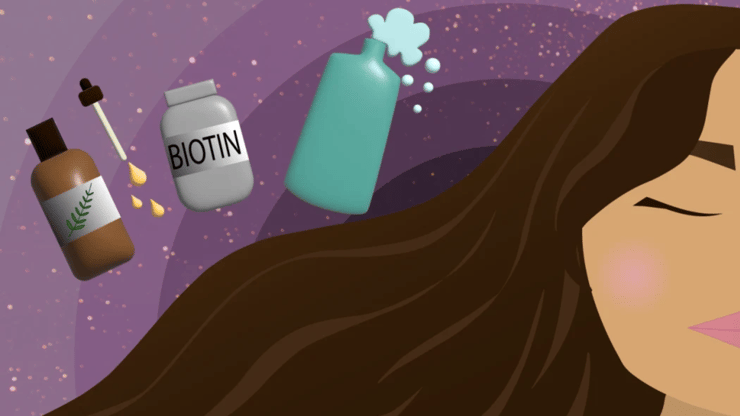Rosemary Oil, Rice Water & Supplements - What actually helps hair to grow

Kirsty Frame has been living with alopecia for seven years. She has been making her own sweet smelling rosemary water to spritz on her scalp every time she washes her hair for the last year-and-a-half.
"I boil up rosemary and water, strain it, put in a little squeegee bottle and just use it as a rinse through my hair, probably every time I wash my hair. It smells nice, it makes my scalp feel really good which is always good for your hair health, I suppose."

Kirsty Frame's homemade rosemary water smells nice and makes her scalp feel good. Photo: Supplied / Kirsty Frame
She doesn't credit her current long hair or new hair growth to the DIY treatment, but the former journalist, who has written about her autoimmune condition, says it's an easy and affordable way to show her scalp some love after having tried countless products prior to being diagnosed in 2018.
"I remember I was just buying so many like [hair growth] supplements and special shampoos.
"I was putting all these weirds oils in my hair and I had this like spray bottle that I got from a sort of natural store which probably did something, but it wasn't really like giving me the solution that I wanted, which was for my hair to grow back."
She tried out rosemary water after finding others boasting about it online as part of their hair care routine. Rosemary essential oil blends and rosemary water are being spruiked online as a treatment to make hair thicker or to stimulate hair growth.

Kirsty Frame, pictured in 2022. Photo:RNZ
Auckland dermatologist Harriet Kennedy, who regularly consults people with hair loss concerns, says she's noticed a boom in the natural skin and hair care market, but there was little scientific evidence behind much of what was being sold.
In fact, people are more likely at risk of developing problems, such as skin irritation and sensitivity, from using plant-based products than to see benefits, she says.
Auckland hairstylist Melissa Bowden Brooks says rice proteins and rosemary have been used in shampoos and hair treatments for years, but she wouldn't recommend people use unadulterated ingredients on their scalp without having done proper research.
"When I see that [rosemary and rice proteins] included in a shampoo or a treatment or something like that, I know that that's a good thing and it's very stimulating for your scalp and it can improve circulation and blood flow, so ultimately that's great for hair growth."
But is there any scientific evidence behind these ingredients?
What do we know about rosemary oil's effects on the hair?
Dr Kennedy says rosemary oil studies have often been small and not scientifically rigourous, but there was some evidence it could help increase blood flow to hair follicles and act as an antioxidant.
But one of the most promising studies, published in 2015 by the SKINmed Journal, on the effects of rosemary oil for treatment of androgenetic alopecia is riddled with problems, says Australian-based beauty scientist Dr Michelle Wong.

Dr Michelle Wong is sceptical about the efficacy of rosemary oil on hair growth. Photo: Dr Michelle Wong
In one of her YouTube videos dissecting the research earlier this year, Dr Wong says dermatologists have pointed out flaws in the research, including the methodology and supposed "significant" results not being so significant.
"I don't think it [the study] really tells us much at all. The most generous thing we could say, in my opinion, is that in a study that has really sus[pect] numbers where a low concentration of minoxidil unsurprisingly didn't do very much, rosemary oil also didn't do much."
She notes there have been other studies where rosemary oil is just one of the components used to help treat alopecia or where a different form of rosemary extract was used.
Rosemary essential oil can also become a skin irritant if it's not diluted properly with other carrier oils.
Dr Kennedy says rosemary water also lacks scientific evidence.
"It's an example of how you can have difficulty with natural products that aren't regulated as you can't clearly know the concentration or potency of what you are paying for/using."
What about other things like biotin, collagen and rice water?
Rice water has traditionally been used in Asian cultures for beauty and hair care but Dr Kennedy says there's no good evidence to back it up either.
"There've been some studies done to look at what it does to hair follicles in the lab, but there haven't been any studies looking at what it actually does in humans."

Dr Harriet Kennedy: There's a dearth of good scientific evidence on effective hair treatments. Photo: Supplied
Another study, published last year in the JAMA Dermatology Journal, looked at all the available evidence for supplements to help with hair growth, she says.
"And again, lots of small studies or studies that aren't designed particularly well, but there appeared to be a bit of evidence for zinc, marine collagen, saw palmetto and pumpkin seed oil, which work on the androgen receptors in our hair."
Using biotin (vitamin B7) as a supplement for hair growth can be tricky, Dr Kennedy says, because it can interfere with blood tests, in particular one done for people suspected of having a heart attack.
"So for that reason, there's been a recommendation that people don't take it for things like hair loss really. It would only be recommended if you were known to be deficient in biotin."
On the other hand, biotin in shampoos is unlikely to interfere with blood test results, she says, but that also means it probably wouldn't be as effective either, due to low absorption.
So is it worth buying expensive hair growth shampoos?
Frame knows all too well what it's like to want to find a quick miracle solution to boost hair growth. After losing most of her hair over several months, she had a shelf full of products promising her stronger and longer hair, but none were good enough to help against her condition.
"I think that's the thing with a lot of these hair growth stuff that's promoted… it's like well, yes, it can be true, but it's also probably not like the miracle thing you're thinking it is."
Most of those coming to see Dr Kennedy for hair loss concerns had already tried some form of hair growth products, such as shampoos, lotions, or hair and nail supplements.
But the value for money spent on hair growth shampoos would be negligible, because they lacked evidence of being effective, she says.
"A shampoo is on the scalp for a such a short amount of time that it's really unlikely any shampoo or conditioner is actually going to make any meaningful medical difference at the level of the hair follicle.
"What shampoo and conditioner may do is actually strengthen the hair shaft so that your hair doesn't break, so particularly if you've got damaged hair then that could be beneficial. But actually, in terms of growth from the hair follicle, you're just not going to be absorbing anything."
So what can we practically do?
Dr Kennedy and Bowden Brooks both say hair care is similar to skin care - avoid irritants and keep your hair moisturised.

Hair stylist Melissa Bowden Brooks: Products that improve circulation and blood flow to the scalp will be great for hair growth." Photo: Supplied
- Be careful with hair dyes, they can damage the hair shaft.
- Avoid wearing tight hair styles on a regular basis, because they can cause traction which in turn can cause breakage and hair fall at the follicle level.
- Massage your scalp to stimulate blood flow.
- Note that genetics can play a big part in whether you have fine or thick hair.
- Check to see if you have any deficiencies (such as in zinc) which you can look after with lifestyle or diet changes.
- Bowden Brooks recommends people avoid the "baddies" in hair products, such as sulfates, parabens and silicones. There are different kinds of sulfates, some of which can strip your hair of its natural oils and cause breakage, she says.
- Don't stretch the hair when it's wet because that can cause breakage as well. Use a soft paddle brush if you need to detangle while it's wet.
- Be mindful of heat damage from blow dryers or heat styling. Use a heat protectant to minimise this type of breakage, Bowden Brooks says.
In her YouTube video on rosemary oil, Dr Wong says hair loss treatments generally are better at helping keep your current hair and making it thicker.
"The longer you try out less proven remedies and delay using more proven treatments, the worse your outcomes will actually be."
Frame says people confronted with hair loss can be at their most vulnerable and can often end up buying lots of products as an emotional response.
"When I finally got diagnosed, remember saying to my doctor, I was like 'yeah I've been like putting apple cider vinegar in my hair', and I was like doing all these things and he was like 'if there was a cure - if apple cider vinegar was the cure for alopecia, you'd know by now'.
"But I can also see that point where I probably could've saved a lot of money and used that towards my dermatologist bills."
Most importantly, Dr Kennedy advises people to try to get a diagnosis if they are concerned about hair loss.
"There's lots of different reasons that people could lose hair, there could be a deficiency, it could be a hormonal imbalance, it could be a normal genetic process which is just happening perhaps a bit earlier in life than what you'd like, but there's some autoimmune conditions that cause hair loss as well, and they're all medically treated very differently."







Leave a Comment